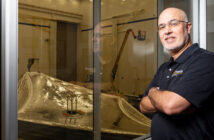This is ridiculous, I thought as I closed my eyes and planted my feet firmly on the floor along with my peers. At some point my skepticism had overpowered my tolerance for mindfulness and meditation. I could feel myself growing more impatient with every passing second, wondering when the two minutes would be over.

Becca Wilkin
Although I blamed my intolerance for these meditation and yoga practices on my own cynicism, I ultimately realized that my insecurity was the issue. Frankly, I was uncomfortable being alone with nothing but my own thoughts.
We live in a world of constant communication, instant gratification and infinite deadlines. I had become a victim of the cycle, so ensnared in my hectic daily routine that I had no time to waste meditating. It was not until I collapsed under the weight of my perpetually accumulating stress that I recognized my habits needed to change.
According to Psychology Today, mindfulness “is a state of active, open attention on the present.” It is a means of focusing on the current moment and neutrally distancing oneself from one’s thoughts and emotions, accepting them as they come.
After discussing the scientifically proven benefits of mindfulness practices in my TRAC fellow seminar class, I finally conceded to the idea that this mindfulness might actually help me.
We began each class with two minutes of meditation, focusing on our breathing while acknowledging our thoughts and letting them pass. What I once considered monotonous and silly was now keeping me calm, focused and more attentive to my surroundings.
According to The Washington Post, a study done by Harvard neuroscientists found that meditation and mindfulness were linked with “decreased stress, decreased depression, anxiety, pain and insomnia, and an increased quality of life.”
The study, which analyzed the progress of both long-term meditators and a control group, also indicated that the meditators had more gray matter in the frontal cortex of the brain, which is associated with memory and decision making.
Originally I was convinced that mindfulness was keeping me from my work and responsibilities. However, following a class discussion, I realized that meditating as little as two minutes before beginning my work helped me to concentrate without distraction or procrastination. Meditating ultimately allowed me to finish my work in a timely manner and left me with more opportunity to unwind.
Meditation is not the only mindfulness practice. Some informal practices include simply paying attention to certain objects or ideas. One week, our class was instructed to notice the color blue, and on another we were told to observe the trees as we walked around campus. Not only did these activities help me to relax, but they allowed me to take a pause from my chaotic day and appreciate the natural beauty of our campus.
Perhaps my favorite mindfulness activity was creating a list of five things I was thankful for at the end of the day. The most difficult aspect of this activity was not repeating anything that was written on a previous list.
On the first day my list was comprised of family, friends, safety, freedom and education. As the week progressed I found that I was thankful for things like, “the text message from my Mom,” “my roommate washing the bowl I had left in the sink,” and “the way the sky looked at sunset.”
Mindfulness allowed me to develop a greater appreciation for the little things and aided me in becoming a more compassionate, observant and thoughtful individual.
“I want enough time to be in love with everything,” wrote Marina Keegan, author of “The Opposite of Loneliness: Essays and Stories.” Perhaps we will never have enough time to do this, but if we take a moment to pause and reflect, we may be surprised by how much we see.
We live in a world of so much beauty and to overlook it would be tragic. If we open our minds and embrace the present moment, we can capture this beauty and even share it with others.
And all it takes is two minutes.
—
Rebecca Wilkin, ’18, is an assistant news editor for The Brown and White. She can be reached at [email protected].





Comment policy
Comments posted to The Brown and White website are reviewed by a moderator before being approved. Incendiary speech or harassing language, including comments targeted at individuals, may be deemed unacceptable and not published. Spam and other soliciting will also be declined.
The Brown and White also reserves the right to not publish entirely anonymous comments.